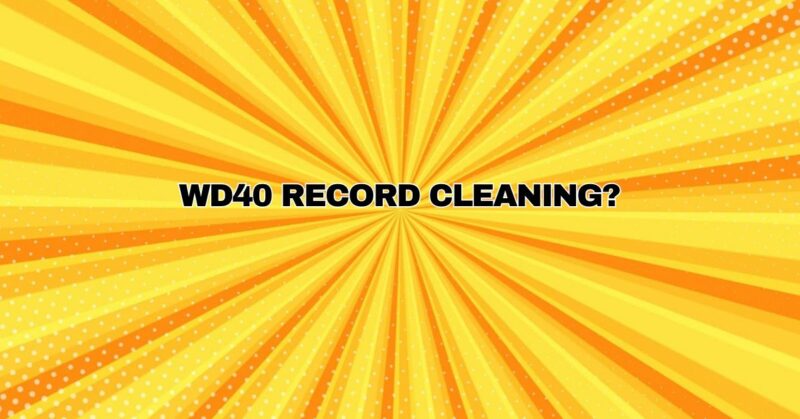Vinyl records have made a remarkable resurgence in recent years, captivating music enthusiasts with their analog warmth and tactile charm. As vinyl gains popularity, so do the various myths and unconventional cleaning methods associated with record maintenance. One such myth involves the use of WD-40 as a record cleaning solution. In this comprehensive article, we will delve into the truth behind using WD-40 to clean vinyl records, its potential risks, and why it’s generally not recommended by experts in the vinyl community.
The Myth: Using WD-40 for Vinyl Record Cleaning
The myth suggesting that WD-40 can be used to clean vinyl records has circulated among vinyl collectors and enthusiasts. Proponents of this method claim that WD-40 can effectively remove dirt, dust, and even scratches from records. The belief is rooted in the idea that WD-40, a versatile and multipurpose lubricant and solvent, could potentially break down contaminants on the record surface.
The Reality: The Dangers of Using WD-40 on Vinyl Records
While WD-40 has proven utility in various household and automotive applications, it is not an appropriate choice for cleaning vinyl records for several compelling reasons:
- Chemical Residue: WD-40 leaves behind a chemical residue when applied to surfaces. This residue can be challenging to remove entirely from the grooves of a vinyl record and may adversely affect its sound quality.
- Risk of Damage: Vinyl records are delicate, and their grooves contain the audio information. WD-40’s chemical composition may interact with the vinyl material, leading to potential damage, warping, or degradation of the record.
- Surface Noise and Static: WD-40 residue can attract dust and debris to the record’s surface, increasing surface noise and static during playback. This can significantly diminish the listening experience.
- Label Damage: The paper labels on vinyl records are also susceptible to damage from WD-40. It can cause label discoloration, fading, or even label peeling.
- Inadequate Cleaning: While WD-40 may temporarily remove surface dirt, it does not address deeper cleaning needs, such as removing mold, mildew, or embedded contaminants within the record’s grooves.
Proper Vinyl Record Cleaning Methods
Maintaining the sound quality and longevity of your vinyl records requires the use of appropriate cleaning methods and tools. Here are recommended steps for proper vinyl record cleaning:
- Dry Cleaning: Start by using a high-quality carbon fiber or anti-static brush to remove loose dust and debris from the record’s surface. Gently brush in a circular motion before and after each play.
- Wet Cleaning: For more thorough cleaning, invest in a dedicated record cleaning solution and a microfiber cloth or a specialized record cleaning brush. Apply the solution as instructed and clean the record’s surface gently using a circular motion. Wipe off any excess solution with a clean, lint-free cloth.
- Record Cleaning Machines: Serious vinyl enthusiasts may consider using a record cleaning machine that employs vacuum suction to extract dirt and cleaning solution from the record’s grooves.
- Proper Storage: Store your vinyl records in anti-static inner sleeves and protective outer sleeves to prevent dust and potential damage. Keep them vertically in a cool, dry environment, away from direct sunlight and extreme temperature fluctuations.
- Handle with Care: Always handle vinyl records by their edges to avoid touching the playing surface, which can transfer oils and dirt to the grooves.
Conclusion: Preserving Vinyl Records with Care
While the allure of a quick fix for cleaning vinyl records may be tempting, the potential risks and damage associated with using WD-40 make it an unsuitable choice for record maintenance. To ensure the sound quality and longevity of your vinyl collection, it’s essential to follow proper cleaning and preservation procedures using dedicated vinyl record cleaning products. By giving your records the care they deserve, you can continue to enjoy the warm, analog sound and immersive experience that vinyl records provide.


